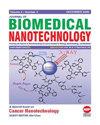MiR-92a 通过调节 Wnt/β-Catenin 通路促进心肌缺血再灌注损伤大鼠的细胞凋亡
IF 2.9
4区 医学
Q1 Medicine
引用次数: 0
摘要
本研究探讨了微核糖核酸(miR)-92a对心肌缺血再灌注损伤大鼠的影响,重点是其对Wnt/β-catenin通路的调控。研究人员将 36 只 Sprague Dawley 大鼠分为三组:假手术组、模型组和 miR-92a 抗凝剂组。假手术组大鼠在不受伤害的情况下接受开胸手术,模型组和 miR-92a 抗凝集物组大鼠在接受心肌缺血再灌注损伤后分别接受生理盐水和 miR-92a 抗凝集物治疗。结果表明,与模型组相比,miR-92a antagomir 组的心肌梗死面积明显缩小。组织学分析显示,miR-92a 抗凝剂组的心肌组织结构有所改善。Western 印迹显示,在模型组和 miR-92a 抗凝剂组中,p-GSK-3β 和 β-catenin 的水平均升高,与模型组相比,miR-92a 抗凝剂组的水平明显下降。此外,与假体组相比,模型组和 miR-92a 抗病毒组的 miR-92a 表达量都更高。最后,模型组和 miR-92a 抗病毒药物组的细胞凋亡率都有所增加,但与模型组相比,miR-92a 抗病毒药物组的细胞凋亡率明显降低。总之,这些研究结果表明,miR-92a 通过上调 Wnt/β-catenin 信号通路,加剧了心肌缺血再灌注损伤大鼠的细胞凋亡。本文章由计算机程序翻译,如有差异,请以英文原文为准。
MiR-92a Promotes Apoptosis in Rats with Myocardial Ischemia-Reperfusion Injury via Regulating Wnt/β-Catenin Pathway
In this study, the impact of micro ribonucleic acid (miR)-92a on rats with myocardial ischemia-reperfusion injury was investigated, with a focus on its regulation of the Wnt/β-catenin pathway. A total of 36 Sprague Dawley rats were divided into three groups: a sham operation
group, a model group, and a miR-92a antagomir group. The sham group underwent thoracotomy without injury, while the model and miR-92a antagomir groups were subjected to myocardial ischemiareperfusion injury and treated with saline and miR-92a antagomir, respectively. Results showed that the
myocardial infarction area was significantly reduced in the miR-92a antagomir group compared to the model group. Histological analysis revealed improved myocardial tissue structure in the miR-92a antagomir group. Western blotting demonstrated elevated levels of p-GSK-3β and β-catenin
in both the model and miR-92a antagomir groups, with a notable decrease in the miR-92a antagomir group compared to the model group. Additionally, miR-92a expression was higher in both the model and miR-92a antagomir groups compared to the sham group. Lastly, apoptosis rates were increased
in both the model and miR-92a antagomir groups, but significantly reduced in the miR-92a antagomir group compared to the model group. Overall, these findings suggest that miR-92a exacerbates apoptosis in rats with myocardial ischemia-reperfusion injury by up-regulating the Wnt/β-catenin
signaling pathway.
求助全文
通过发布文献求助,成功后即可免费获取论文全文。
去求助
来源期刊
CiteScore
4.30
自引率
17.20%
发文量
145
审稿时长
2.3 months
期刊介绍:
Information not localized

 求助内容:
求助内容: 应助结果提醒方式:
应助结果提醒方式:


